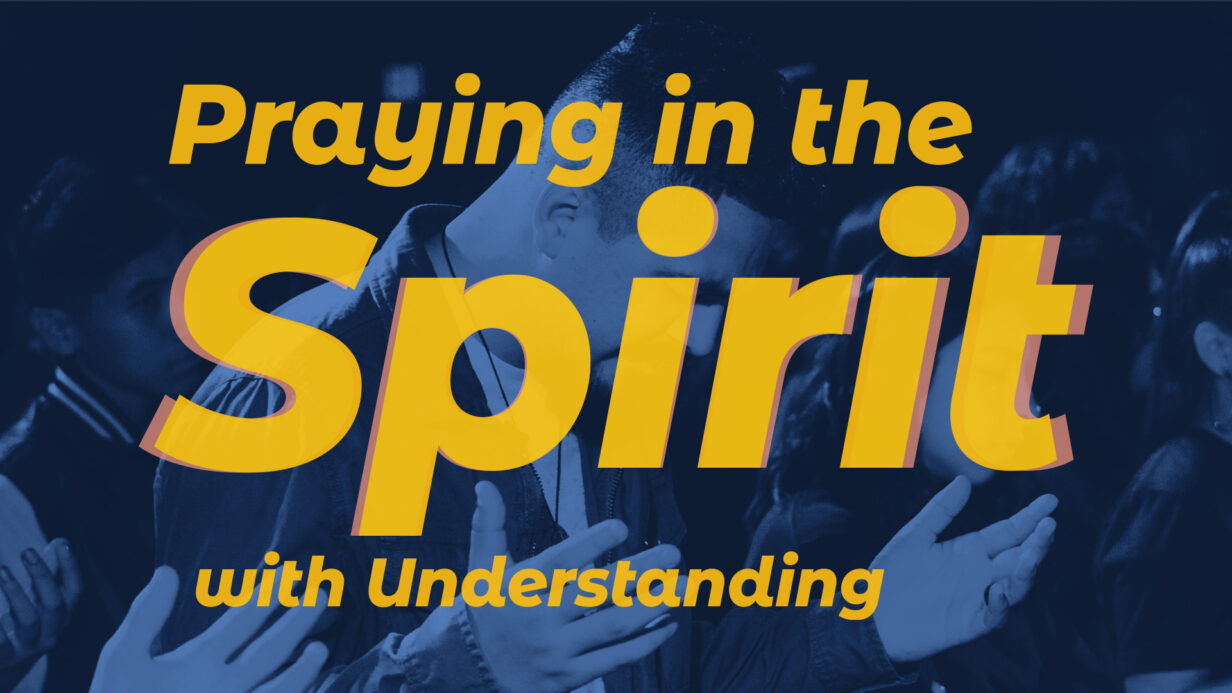
Praying in the Spirit with Understanding
Clayton Endecott | Europe, CIS, and the Middle East General Presbyter
What is it then? I will pray with the spirit, and I will pray with the understanding also: I will sing with the spirit, and I will sing with the understanding also
(1 Corinthians 14:15).
Paul makes a conclusive statement in 1 Corinthians 14:15. How should we pray? How did Paul decide to pray? It was not either/or, but both/and. How should Paul pray—in the Spirit, or pray with the understanding? The answer is YES! Both! Both are important. One works with the other. One accompanies the other. To only pray in tongues or speak in tongues in our gatherings for extended periods of time could easily be confusing. Neither believers nor unbelievers can be comforted or edified by tongues alone. We need to pray with understanding. What kind of understanding? What is this Greek word we render in most languages as “understanding”? Is it intellectual? Is it reason and teaching? Is it facts? Is it being convinced by the Spirit and hearing His testimony? Is it an understanding of the mind or a knowing of the heart? Yes! It can, or perhaps should be, both.
The NKJV says, “I will pray with the spirit, and I will also pray with the understanding”.
In the context of 1 Corinthians 14, the apostle Paul is teaching of the importance of speaking in tongues. Contrary to those critical of the ministries of the Holy Spirit in the church in our day, Paul does not teach that tongues are of little value, but he teaches of their importance and of their place. He says in this chapter: “Therefore tongues are for a sign, not to those who believe but to unbelievers” (1 Corinthians 14:22). This is baffling to many, perhaps an oxymoron! Or is it a mystery too deep for words?
In verse three of chapter 14, Paul says that when we speak in tongues, we are personally edified, or built up, equipped, and strengthened. Sometimes we are spiritually weak, for we fail to speak freely in the tongues of heaven, where the glory and mystery of God can be uttered openly, and even the not-cognitively comprehended petition comes to the altar of prayer and is lifted up by crying out, whispering, and singing in ways which are beyond our lingual barriers and limitations. Clearly, in this context, Paul is concerned about an excessive use of tongues that seems to be present in the new, very enthusiastic church in Corinth where they were so thrilled with the fullness of the Spirit that they sometimes only spoke in tongues, perhaps throughout the whole service, and little of the truth of the Gospel was being proclaimed in a way that all could understand. This is, of course, excess.
However, the excess might be imagined otherwise. Where tongues are not spoken, where no praying in tongues is present, then the people are not personally edified, either. Where there are no messages in tongues or no interpretations are given, then those around the altar of God in a service cannot hear the prophetic word of the Lord proclaimed; they cannot hear God speaking to them plainly by interpretations in their own language. We need to hear from God, we need to pray in the Spirit and with understanding. It seems not all speaking in tongues are messages to the whole church that require interpretation, but when there are such messages in unknown tongues audible to all in a service, then we need to pray for interpretation, also. When it is not a message of tongues for the congregation, then we should pray more quietly, as these seem to be thanksgivings and petitions from our individual hearts that will edify us when we speak them as our prayers more quietly and personally to God. In any event, praying should be an interplay of the Spirit and understanding, sometimes a dance between understanding and mystery. For when we pray, we are in the presence of the Almighty, the All-in-All.
Most Pentecostals understand Paul’s writings in Romans 8 to be addressing a similar topic.
Likewise the Spirit also helps in our weaknesses. For we do not know what we should pray for as we ought, but the Spirit Himself makes intercession for us with groanings which cannot be uttered. Now He who searches the hearts knows what the mind of the Spirit is, because He makes intercession for the saints according to the will of God. And we know that all things work together for good to those who love God, to those who are the called according to His purpose (Romans 8:26–28).
In Paul’s writings, here and elsewhere, we see that prayer begins with the Spirit. He initiates our praise and petitions in our hearts, and we respond in prayer. We speak them out, sometimes in heavenly languages and sometimes with understanding—both!
Prayer is not speaking to God, but instead speaking with God. It is a personal or public conversation which includes both speaking and listening; sharing our hearts, but also being informed, convinced, and empowered by what God is saying to us. Are we taking time to listen to God in prayer? In one of the most famous outpourings of the Spirit in our times— the Azusa revival in the early 1900s—it is said that William Seymore, the African-American son of once slaves, blind in one eye, one of the central figures of the revival, would hide his head in a box in the front of the church. He would bury himself in silence before the Lord for extended periods of time. The old Pentecostal practice of “tarrying” was that of being with God at the altar, in faith and with great expectation, waiting to hear from God. Prayer is tarrying, waiting to hear from heaven.
Prayer is a blending of our thoughts and hearts with the work of the Spirit.
The book of Romans is perhaps the most clearly-stated theological treatise of the New Testament. The doctrines of man, the Trinity, sin, condemnation, salvation, justification, and sanctification, among other important teachings, are expounded and explained.
On Pentecostal matters in the Roman context, Paul introduces the salvific work of the Holy Spirit, His sanctifying and transforming work, and His occupational work in powerful spiritual gifts and anointings. These include clear teachings on tongues, both as a gift (Romans 12 and 14), and some would say, as a prayer language (Romans 8). One of the features of this erudite text in the best of the current Greek of the New Testament day, is its intellectual and noetic argument which appealed to the Greek, the Roman, and the Jewish believers to whom Paul wrote. But in the midst of philosophical and cultural apologetics and teaching is a spirit of prayer, a sense of being in God’s presence in worship and thanksgiving, and not only understanding with the mind, but being spiritually engaged. The work is clearly written on the breath of the Spirit in prayerful commitment to a triune God. In Romans 8:9–11, Paul clarifies that the Spirit of God dwells in us, that we have the Spirit of Christ, in fact, Christ Himself by the Spirit dwells in us, and Paul interchanges in this discussion the terms of Holy Spirit, Spirit of God, and Spirit of Christ.
We often divide the work of the mind and that of the Spirit, but this bifurcation is not found in the entirety of the Pauline tome. We have a prayer before we study. We have worship and we pray so we can learn. We anoint so we can serve or minister. There seems to be a juxtaposition between mind, spirit, and body in most of our matters of faith. There is what we know intellectually, and what we learn by revelation. There is also what we feel emotionally or in our affections which is part of our faith as Pentecostals, and there is what we have experienced in the Spirit, in the church, in the world, in our everyday life. All of these make up our faith and it is almost as if each has its own divided realm. Sometimes we appeal to communication or overlap in such matters, as to how the mind may communicate to the spirit of man, as an example, but these categories of faith remain quite divided for most of us most of the time.
There is little of such compartmental and divided teaching in Paul’s writings, not even in Romans, his perhaps most theological and intellectual work. The mishmash of spiritual and intellectual matters— doing, believing, praying, worshiping, feeling, knowing, learning—somehow all are blended together, and ever-present in the letter to the churches and believers in and about Rome from their apostle. He opens his letter in prayer with thanksgiving and petition to God (Romans 1:8–12). As he teaches of the role of Israel, he mentions his prayers for them (Romans 10:1). In Romans 8, Paul expounds on prayer itself, praying for things we do not even know to pray for, and in Romans 15, his dissertation blends into a benediction prayer for his hearers: that they all live in unity, that they all be filled with joy and peace, and that they abound in hope by the power of the Holy Spirit. He closes his letter of circular intention for the whole west by seeking prayer for himself and for others, that he be delivered, that his ministry unto God be accepted as he travels, and that he could join his readers in Rome in the near future so that they together could be refreshed in fellowship and that God’s peace be with everyone (Romans 15:30–33).
This divided and compartmental thinking is often in commentaries written on praying in the Spirit and praying with understanding, as we find in 1 Corinthians 14:15, quoted at the beginning of this article. Many divide the two; that is there is praying in the Spirit, and then there is praying with the understanding, and they are two separate things. As you see, I am not so convinced. I believe it often is, or could be or should be both, praying in the Spirit and with understanding.
Blaise Pascal, a scientist, physicist, philosopher, and inventor in the seventeenth century, was a committed believer. One of his most famous quotes speaks of matters of the heart: “The heart has its reasons which reason does not know.”
One of my own testimonies of personal experience that I cannot explain easily comes out of times of prayer for others in wonderful Pentecostal church services where we make an altar call. Often, when I pray for someone seeking God, I will receive a special prayer for them. Sometimes as I pray or afterwards, those I pray for share with me that the prayer was the very prayer of their heart, even though we had not spoken of it. This may be one simple and perhaps unusual example of praying in the Spirit and with understanding.
A common testimony we often hear, and some of us give, is of someone who may be multiple nations away from us who is moved on by the Spirit to pray for us. When they share their moment of prayer sometime later when we see them, many of us can testify that we needed that prayer exactly at that time they prayed for us, though the one praying was just simply listening to the Spirit on our behalf. Sometimes when I pray, I have such deep understanding, I have clarity, and I come to powerful, well-reasoned moments of enlightenment. At other times, I pray in the dark, unknowingly. Towards the light, I speak as my heart is led of the Holy Spirit, and while I do not fully understand, I fully believe. I want to pray in the Spirit and with understanding.

